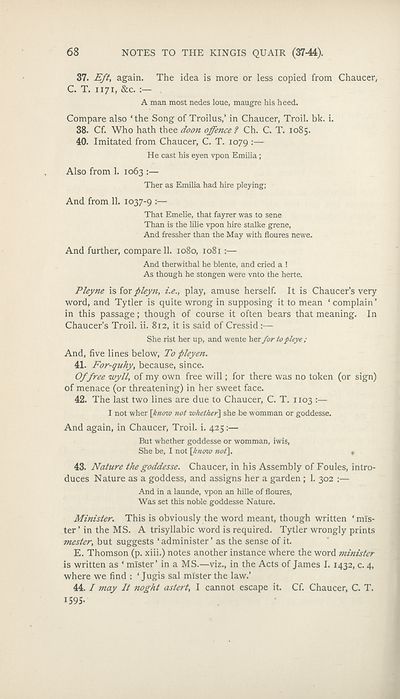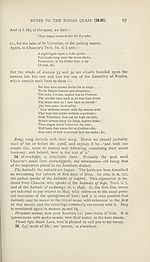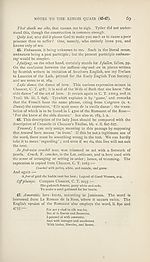Download files
Complete book:
Individual page:
Thumbnail gallery: Grid view | List view

68
NOTES TO THE KINGIS QUAIR (37-44).
37. Eft, again. The idea is more or less copied from Chaucer,
C. T. 1171, &c. :—
A man most nedes lone, maugre his heed.
Compare also ‘the Song of Troilus,’ in Chaucer, Trail, bk. i.
38. Cf. Who hath thee doon offence ? Ch. C. T. 1085.
40. Imitated from Chaucer, C. T. 1079 :—
He cast his eyen vpon Emilia;
Also from 1. 1063 :—
Ther as Emilia had hire pleying;
And from 11. 1037-9 :—
That Emelie, that fayrer was to sene
Than is the lilie vpon hire stalke grene,
And fressher than the May with floures newe.
And further, compare 11. 1080, 1081 :—
And therwithal he blente, and cried a !
As though he stongen were vnto the herte.
Pleyne is for -pley)i, i.e., play, amuse herself. It is Chaucer’s very
word, and Tytler is quite wrong in supposing it to mean ‘complain’
in this passage; though of course it often bears that meaning. In
Chaucer’s Troil. ii. 812, it is said of Cressid
She rist her up, and wente her for to ■pleye ;
And, five lines below, To pi eyen.
41. For-quhy, because, since.
Of free wyll, of my own free will; for there was no token (or sign)
of menace (or threatening) in her sweet face.
42. The last two lines are due to Chaucer, C. T. 1103 :—
I not wher [know not whether^ she be womman or goddesse.
And again, in Chaucer, Troil. i. 425:—
But whether goddesse or womman, iwis,
She be, I not [know not\. ,
43. Nature the goddesse. Chaucer, in his Assembly of Foules, intro¬
duces Nature as a goddess, and assigns her a garden ; 1. 302 :—
And in a launde, vpon an hille of floures,
Was set this noble goddesse Nature.
Minister. This is obviously the word meant, though written ‘ mis¬
ter’in the MS. A trisyllabic word is required. Tytler wrongly prints
tnester, but suggests ‘administer’ as the sense of it.
E. Thomson (p. xiii.) notes another instance where the word minister
is written as ‘ mister’ in a MS.—viz., in the Acts of James I. 1432, c. 4,
where we find : ‘ Jugis sal mister the law.’
44. / may It noght astert, I cannot escape it. Cf. Chaucer, C. T.
1595-
NOTES TO THE KINGIS QUAIR (37-44).
37. Eft, again. The idea is more or less copied from Chaucer,
C. T. 1171, &c. :—
A man most nedes lone, maugre his heed.
Compare also ‘the Song of Troilus,’ in Chaucer, Trail, bk. i.
38. Cf. Who hath thee doon offence ? Ch. C. T. 1085.
40. Imitated from Chaucer, C. T. 1079 :—
He cast his eyen vpon Emilia;
Also from 1. 1063 :—
Ther as Emilia had hire pleying;
And from 11. 1037-9 :—
That Emelie, that fayrer was to sene
Than is the lilie vpon hire stalke grene,
And fressher than the May with floures newe.
And further, compare 11. 1080, 1081 :—
And therwithal he blente, and cried a !
As though he stongen were vnto the herte.
Pleyne is for -pley)i, i.e., play, amuse herself. It is Chaucer’s very
word, and Tytler is quite wrong in supposing it to mean ‘complain’
in this passage; though of course it often bears that meaning. In
Chaucer’s Troil. ii. 812, it is said of Cressid
She rist her up, and wente her for to ■pleye ;
And, five lines below, To pi eyen.
41. For-quhy, because, since.
Of free wyll, of my own free will; for there was no token (or sign)
of menace (or threatening) in her sweet face.
42. The last two lines are due to Chaucer, C. T. 1103 :—
I not wher [know not whether^ she be womman or goddesse.
And again, in Chaucer, Troil. i. 425:—
But whether goddesse or womman, iwis,
She be, I not [know not\. ,
43. Nature the goddesse. Chaucer, in his Assembly of Foules, intro¬
duces Nature as a goddess, and assigns her a garden ; 1. 302 :—
And in a launde, vpon an hille of floures,
Was set this noble goddesse Nature.
Minister. This is obviously the word meant, though written ‘ mis¬
ter’in the MS. A trisyllabic word is required. Tytler wrongly prints
tnester, but suggests ‘administer’ as the sense of it.
E. Thomson (p. xiii.) notes another instance where the word minister
is written as ‘ mister’ in a MS.—viz., in the Acts of James I. 1432, c. 4,
where we find : ‘ Jugis sal mister the law.’
44. / may It noght astert, I cannot escape it. Cf. Chaucer, C. T.
1595-
Set display mode to: Large image | Zoom image | Transcription
Images and transcriptions on this page, including medium image downloads, may be used under the Creative Commons Attribution 4.0 International Licence unless otherwise stated. ![]()
| Publications by Scottish clubs > Scottish Text Society publications > Old series > Kingis quair > (128) |
|---|
| Permanent URL | https://digital.nls.uk/106994011 |
|---|
| Description | A collection of over 100 Scottish texts dating from around 1400 to 1700. Most titles are in Scots, and include editions of poetry, drama, and prose by major Scottish writers such as John Barbour, William Dunbar, Gavin Douglas, and George Buchanan. Edited by a key scholarly publisher of Scotland's literary history, and published from the late 19th century onwards by the Scottish Text Society. Available here are STS series 1-3. |
|---|

